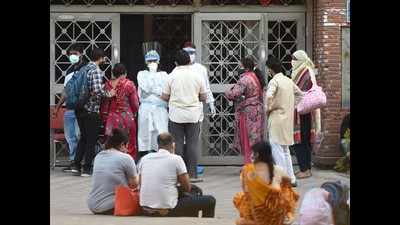- News
- City News
- Hyderabad News
- New Covid-19 variants take shape in bodies of patients, finds study
Trending
This story is from July 29, 2021
New Covid-19 variants take shape in bodies of patients, finds study
Scientists from different research institutions, including the city-based Centre for Cellular and Molecular Biology (CCMB) have claimed to have decoded the mystery behind the emergence of new variants of novel coronavirus.

In a research study published on July 27 on the preprint server MedRxiv, the scientists said the virus undergoes changes in the body of an infected person and once it’s done, it infects new people carrying the changes with it.
This results in the emergence of new variants. The team found that about 80 per cent of the genomes sequenced in individuals had later emerged as new variants or strains.
Follow TOI's live blog for latest updates on Coronavirus
Scientists say tracking over time within-host variability of the virus in individuals and populations might provide important leads to the sites that are favourable or harmful.
This information would be of enormous utility for predicting the spread and infectivity of viral strains in the population. Conjoint analysis with the intra-host variability of the novel coronavirus genome should be the next step,” the study says.
Besides CCMB, researchers from Institute of Genomics and Integrative Biology (CSIR-IGIB), Delhi, Institute of Life Sciences, Bhubaneswar, Academy for Scientific and Innovative Research, Ghaziabad, National Centre for Disease Control, New Delhi, and Indian Institute of Technology, Jodhpur, participated in the study.
The researchers analysed samples of Covid-19 patients from two different time-periods of the pandemic. In phase 1, the team analysed 1,347 samples collected by June 2020 from China, Germany, Malaysia, United Kingdom, United States and different subpopulations of India to perceive a genome-wide intra-host single nucleotide variation (iSNV) map in Covid-19 patients. Single nucleotide variation (SNV) is a substitution of a nucleotide (a basic building block of nucleic acid or genetic material) for another.
The team observed 18,146 iSNV sites spanning the viral genome, including residues that defined the B.1 and B.6 lineages of the virus that were prominent in the listed populations before June 2020.
“Interestingly, 41% of all unique iSNVs identified in these samples were found to be reported as an single nucleotide variation or SNV by September 30, 2020 in one or more samples submitted in GISAID, increasing to about 80% by June 30, 2021. The likelihood that iSNVs can overtime manifest into SNVs in populations was further substantiated in phase 2 by analysing 1,798 samples sequenced in India between November 2020 and May 2021,” the researchers said.
They found that iSNVs in most of the Delta (B.1.617.2) and Kappa (B.1.617.1) lineage-defining genomic positions prior to their fixation as SNVs by February 2021. “These results highlight the importance of recording iSNVs as an extension to the genomic surveillance programs to enable more accurate models for viral epidemiology,” they said.
The team also found iSNVs in around 87% of the sites in the spike protein that have been recently reported to confer antibody resistance. These mutations can have major implications in vaccine response as they could alter the immunogenicity.
End of Article
FOLLOW US ON SOCIAL MEDIA











